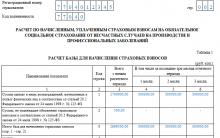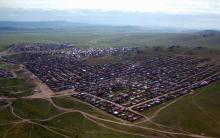Institute of Social Analysis and Forecasting at RANEPA, in the second half of 2017, Russians began to spend more - largely due to consumer loans. Over the seven months of this year, banks issued almost 17 million loans for a total of 2.7 trillion rubles. Quite often, debts to banks subsequently force one to tighten their belts and give up expensive trips and purchases, but this does not always happen. The Village found people who took out several loans and paid them off regularly without giving up their usual pleasures.
Andrey
(name changed at the request of the hero)
Four loans have been issued to me, I owe the banks a total of about 300 thousand rubles. I recently got married. In order not to put all the expenses on the parents, we took out another loan for the bride - for another 100 thousand. That is, we both already owe banks 400 thousand rubles.
Until some point, taking out a loan was scary. It always seemed to me that this was an extreme step when there was no way to get money. Then you go to the bank, sign documents and doom yourself to bondage. But then my income became more stable. Plus, some side projects often came up, thanks to which my monthly income doubled. So one day I signed up for a credit card.
It was a credit card with a small limit and an interest-free period of 100 days. So for the first year and a half of using it, I never paid more than what I spent. I always contributed the required amount on time and had no problems. And then the side projects ended, I spent a lot on gifts and trips to relatives for Far East, for which I took out a cash loan (I closed it a year ago). In general, I stopped being calculating and began to hope that one day all my debts would be paid off anyway.
I got another credit card to start a small business. The investment required was small, so I figured that I would pay off the debt in a couple of months. How painfully I was wrong - the business did not take off. What saved me was that I didn’t quit my full-time job, which only took about five hours a day. The salary made it possible to pay minimum monthly payments and keep a significant part of the income for themselves. By the way, to run a business, I bought a MacBook on credit (hello to all startups!), and recently changed my iPhone. Also on credit.
It all sounds so-so, I understand. It’s like I’m a crazy person who took out loans in the hope of paying them back someday. Actually, that’s true, but at the same time I’m not subsisting on bread and water. Quite recently, my wife and I moved to Moscow and began to earn more. Although expenses have increased, of course: rent, transport, groceries and food in establishments - everything costs more. But whether in Moscow or in our Siberian town, we don’t tighten our belts and don’t deny ourselves entertainment and travel. And planning helps a lot with this.
We do not use any financial planning programs. It's hard to force yourself to keep records all the time. But as soon as the salary arrives on the card, the first thing I do is transfer the required amount to credit and savings accounts. This way I limit the free amount that can be spent on something else. Well, no application will help you control yourself. And the calculations can be done on paper.
I have a plan to close all loans. And if everything is clear with loans for an iPhone and MacBook - you know exactly when it will all end - then with credit cards it is more and more complicated. You can pay endlessly minimum amounts and never close the debt. So I added up the debts and divided the amount by 12 months. I rounded the resulting numbers up by a couple of thousand in order to pay off my debts a little earlier. It comes out to 35 thousand a month to repay loans. In addition, I save 10% of my income for retirement and another 10% for a trip to Paris.
Thus, about 70% of our family's monthly income goes towards paying off loans, savings, rent and other monthly payments. And we spend the remaining 30% on going to cafes, clothes and other joys of life. On weekends we go to the cinema, have breakfast at home, and have lunch and dinner at some gastro festival or in a cafe. In general, weekends are the most expensive time in terms of finances. In two days we can spend up to 5 thousand rubles.
Now I’m already thinking about what I will spend the money on that will be freed up after all debts are closed in July next year. I'm thinking about mastering long-term investing in securities.
Sergey Savitsky
My wife and I are owners of a family business, law firm"Savitskaya and partners". My wife is the CEO and a practicing lawyer, and I deal with technical issues and IT support.
Now we have two loans of one million rubles each. The total amount of monthly payments is 64 thousand rubles. We took out our first loan five years ago, when it became necessary to move to a new office. We needed money for repairs and the first months of rent. Of course, there were doubts. We took a risk when it was not yet clear whether this investment would pay off. But since the office differed favorably in both location and design, we decided to take a risk.
Three years later we took out a second loan. By that time we had several debts of 100–150 thousand rubles each credit cards Oh. In addition, the office was again in need of renovation. We decided to put everything together. According to calculations it turned out that monthly payments practically did not change.
These 64 thousand rubles are quite sensitive for us, but I would not say that we are forced to limit ourselves in anything. This summer, for example, the whole family went on vacation. Daily spending remained the same, but I had to give up savings.
There is less than a year left until the final payment of the first loan. And I'm already thinking about paying it off early. It’s possible to save up an amount of 200–300 thousand rubles, but we haven’t done anything yet.
Overall we are calm. We know that between us we will earn 200 thousand rubles in any case. Even if something goes wrong with the business. Accordingly, 30–35% of this figure is not such a critical amount. And the bank from which the loan was taken bombards us with text messages offering loans for large amounts. So in case of force majeure there is a backup plan.
I think that with proper planning and the idea that money does not come out of thin air, there is nothing wrong with loans. Of course, you should take out a loan not to go on vacation, but to take advantage of development opportunities. I wouldn’t take a million rubles to buy a car. So you can end up without money and without a car. And when there is a specific goal and calculations (at least on the knee), then a loan is an easier way out than constant forced savings on the quality of services.
How to stop worrying about debt
Alexander Serov
psychologist
It is unlikely that anyone will argue with the thesis that life without debt is better than life with it. However, debts do happen. And the worst thing you can start doing at this moment is blaming yourself. First, try to figure out how it turned out that you took out these loans. If you don't use the optics of a strict shaming parent, it will almost certainly turn out that there were reasons for this.
Even if these expenses were not essential (for example, at that time in your life you had no other way to please yourself than to fly to Paris or buy a new iPhone), try to stop scolding yourself for it and at least be understanding, or better yet, with compassion and tenderness. Blaming yourself for something that has already happened will not help you repay the debt, but it will cause a feeling of guilt, which will make it even more difficult to repay your debts.
The next step is to analyze your personal or family budget and correlate the amount of income, expenses and debts. Sometimes it’s easier to strain yourself, pay off the debt and close this topic once and for all, but if the debt is large and your income does not allow you to deal with it quickly, you should think about the standard of living that you can now afford. The main task is to find a balance between starting to systematically pay off debts at least at the level of the minimum payment, and not reducing the standard of living to an uncomfortable level. It is unlikely that you will remain motivated and cheerful to repay the debt if you begin to mope from the inability to spend the money you earn on your favorite food, health and hobbies.
It is natural to worry about debt and feel discomfort about it. These experiences do not allow you to give up and forget about the obligations that you assumed to the bank along with the loan. The main thing is not to turn into your own personal prison guard, who hits you on the wrist every time you want to please yourself with something, because having debts, even large ones, is hardly a reason not to enjoy life.
Anyone can face financial difficulties. Modern financial market offers alternative ways to solve such problems, and many citizens resort to the services of lenders. However, loans are not only a financial burden on own budget, but also serious experiences and stress.
In order to learn how to use funds rationally and set priorities correctly, it is important to understand how to live on credit correctly and hassle-free, and whether it is profitable. It is necessary to take into account the subtleties of obtaining loans, be able to save correctly when paying off debt, and try not to take out credit products in the future.
Is it profitable to live on credit: pros and cons
How to choose the right loan?
The most important and significant factor is the ability to choose a loan in such a way that you can repay it in a timely manner and without much effort. established deadlines. Obtaining loans has two sides:
- Firstly, settle your financial difficulties and forget about the problem for a while.
- Secondly, the solution to one question gives rise to another. Everything must be paid for, and the funds spent must be returned on time, including interest.
It is important not to focus your attention on the first factor, but to approach debt repayment as seriously as possible, so as not to run into a problem when all the money is spent on loans and it is not clear how to live without a livelihood. To do this you need:
- Conduct an independent analysis of your budget. To prevent an immediate solution to the problem from placing a heavy burden on the family budget, experts recommend calculating your budget in such a way that a quarter of the total income remains for repaying loans. In this case, it is necessary to take into account mandatory payments for utility costs, mandatory payments for kindergarten, school, purchase of food, medicine. One debt should not give rise to a new one - the main rule of financial rationality.
- A strategic decision must be based on common sense and factual analysis. You should not rely on estimated income. It is better to take into account the entire financial burden, taking into account the stable income you have. If an increase is expected in the future wages, then you should wait for this moment and only then make a decision.
- When deciding to take out a loan, you need to not only calculate your finances, but also have backup options in case of unforeseen situations. This strategy not only minimizes risks, but also allows you to be calm in the future.
- If the decision to borrow money has been made, you need to carefully study the lender market and get acquainted with all the offers. Many banks are developing special credit programs, carry out promotions. If this option is acceptable and the bank is actually conducting an honest promotion, it is worth taking advantage of the advantageous offer.
Savings or temporary measure?
Excessive self-confidence or ignoring basic rules for calculating a budget can lead to a sad situation and make you wonder how to live with loan debts. In this case, you can reduce the negative impact of debt repayment to a minimum. To do this, you need to turn on the economy mode. It doesn't have to be tough. It is worth limiting yourself to:
- Rethinking food. There is no need to deny healthy eating; you can simply give preference to analogues of expensive products at an affordable price, and take advantage of regular seasonal promotions from supermarkets.
- Avoiding impulse purchases. Try not to go shopping unless absolutely necessary, but to buy only what you really need. In general, in order not to become hostage to huge debts and not worry about how to live and plan expenses, it is worth preventing the situation and limiting yourself in unnecessary spending if you have a lot of debts.
- Try to find additional source income, it is possible to search for additional income.

How to no longer live in debt?
It's important to learn live within your means and try not to take out loans in the future. Many malicious debtors know how to live constantly in a debt hole, but there is nothing good about it. It should be remembered that:

Life story
 Hello. My name is Katya. I'm a little in favor. I have three children, until recently I was married and considered myself happy man. Then problems with money began. My husband has a seasonal job and could stay at home for 4 months. It’s undignified to pay taxes or look for part-time work, etc. We’re not used to saving.
Hello. My name is Katya. I'm a little in favor. I have three children, until recently I was married and considered myself happy man. Then problems with money began. My husband has a seasonal job and could stay at home for 4 months. It’s undignified to pay taxes or look for part-time work, etc. We’re not used to saving.
Until a certain point, we lived in a small family. Then they offered to buy an apartment in a new building at a very favorable price. They took it. We borrowed money from all our relatives, friends and acquaintances. The renovation was completed within six months. I decided that in new life I won't take anything from the old one.

Example of our furniture purchases
IN new apartment bought:
Kitchen set with granite stove;
- bedroom made of natural oak;
- custom-made wallpaper for younger children's bedrooms.
Everything is in debt. The amount is almost the same as the cost of the apartment. The eldest was finishing school by that time and living separately.
After some time, my husband began to leave for Moscow to work. But he sent pennies to support the children. And I have to pay off loans and feed small children. I started taking out loans. At first, small ones, I often applied to microfinance organizations and took out 3-5 thousand “for food.” The result is interest of 20-30 thousand. To give them away and pay for the furniture, she began taking out bank loans. I am an entrepreneur and have my own small business. There is enough money for current expenses, but not to pay off a bunch of loans. The income certificate is minimal, but for some reason money was given everywhere: both cash and credit cards.
Here the eldest one entered a university in another city. There weren't enough points for the budget. There were three times more excellent students and beneficiaries than budget places. There is no hostel. I need to rent an apartment. This is again an expense, partly on me. My husband, fortunately, pays for my studies. Plus she needs to be given water and food. Although he lives separately, with his husband, he is not a stranger.
In general, for several years I worked only to pay not even loans, but interest on them. This continued until it became clear that the younger children did not even have anything to go out in, everything was worn out. Divorced from my husband. He said that my loans are mine to pay. And he doesn’t remember the fact that he didn’t give a penny to the budget for years. He says that he always worked and fed everyone. It worked, but then my mother urgently wanted plasma from the latest model, then I decided to get an AUDI 6 for myself. Now I’m trying to share the court debts with him.
Brief summary. If I knew what this purchase of a kitchen, a bedroom, and a bunch of trinkets for a new apartment would cost me, I wouldn’t even look at them. I would sleep on an old sofa. And so I wanted to live “like everyone else.” Now I'm paying. Loan for loan, I took out a lot of money to pay off old debts. As a result, they hang, and new ones appear. And my ex-husband is doing well. He lived for almost 10 years at my expense, now he changes cars and flies to Thailand every year for vacation.Finally, how to stop living on credit?
- Change your attitude towards the situation, get rid of stress and start planning.
- Take money management under strict control.
- Avoid instant debt.
- If difficulties arise with payments, there is no need to avoid creditors, you must notify the bank and try to find understanding and come to a common consensus. It is better to record the appeal in writing. The bank can provide credit holidays. This does not solve the problem, but it will provide time to find new sources. The creditor can restructure the debt.
- Remove credit cards and do not participate in financial pyramids.
By relying on advice and reconsidering your priorities, you will not only change financial situation, but also improve it significantly.
If you owe money to banks, take one of the ways to reduce your credit burden by taking a short survey. After the survey, you will receive forms that you will need to fill out and send to the bank to reduce your payment or get a deferment.
Imagine on just a minute that you have no credit. Today, meeting a person without debts and loans is very rare. The system hooks us on all sorts of credit programs, promising a beautiful life. What do we get as a result? We become “eternal debtors” and jump from one loan to another, wasting our earned money on interest. In addition to financial losses, there is also psychological damage, because we always remember the debts that hang over us like the “sword of Damocles.” And sooner or later they need to be given away. But how?
Why get rid of loans?
System lending individuals designed in such a way as to encourage consumers to remain in debt. It’s not for nothing that there is a contribution minimum payments, grace period, obligatory repayment before a certain date of the month. If you look closely, then consumer lending does not increase our income in any way, and does not make us free, but vice versa.
Loans have become so firmly entrenched in the lives of Russians that some can no longer imagine life without them. The habit of living on credit came from the West. In Europe and the USA this is quite common. Build a house - on credit, car, household appliances– credit cards. Having three or four loans at a time is also the norm. In Russia, this practice is gaining momentum. But if in the USA the overpayment on a credit card is one percent, then in Russia it is no less than 16 percent. Therefore, in Russia there are always principled, strong-willed people who deny loans, installment plans, mortgages and any types of loans, skillfully doing without them. In the “Pros and Cons” section, members of the Republican Expert Council at the Public Reception of the Head of Komi give their points of view on the question of whether it is possible to do without loans in our time.
Anna Kryazhevskaya, director of a rural small school in the Udora district:
– Loans today are a sore point for the people. They take them without thinking at all about how they will pay later. I think that a loan should be taken as a last resort, that is, if there is nowhere to go, an earthquake happened or something else. What prevents you, as before, from saving money in savings books to purchase large items? But we want it here and now.
It’s surprising that people with low salaries take out loans. And it begins: calls from collectors to the head of the organization, calls to parents, intimidation of the borrowers themselves. Secondly, interest rates lending in our country is very high. It is clear that some people are profiting from this. Fattening while talking in simple language. At the expense of the poor people. It is surprising that often these lenders are believers. I wonder how they confess in church, these robbers of the people?
I would not advise anyone to take out a loan. This debt hole, which drives some into the coffin. I took out a loan for the only time in my life - not for myself, for the children, and after I paid off, I crossed myself. I don’t know about others, but my salary and pension combined are only enough for a month’s living. Comfortable, true, but there is never a surplus. Loans are a great deception of the people.

Nikolay Onishchik, head rural settlement"Barely":
– I can say with confidence that it is impossible to do without loans today. Personally, my total monthly income is a little more than 90 thousand rubles, but I constantly take out bank loans, pay them off on time or even ahead of schedule, have a good credit history, and they give me a loan without any questions. When going on vacation, I always take out a loan of about 170-200 thousand rubles in order to have a normal rest and help my relatives who live in Ukraine. There was a need to renovate the kitchen and purchase furniture - I also took out a consumer loan.
Of course, it would be nice if bank interest was smaller. I believe that it should be no more than ten and tend to decrease. Why in the West is it between four, six and eight percent, while in our country it is 18-24? This is a lot, considering the level of salaries in the West and here. I'm not talking about mortgages at all. In addition to the fact that you have to pay at least 11.9 percent, you also have to pay insurance every year in the amount of 27.5 thousand rubles, or even more. I am a military pensioner, I finished my service with the rank of colonel, I held a normal position and am working now, but there are few people like me compared to the bulk of the inhabitants of our country.
Americans are using borrowed money less and less - under the influence of circumstances or due to the emotional burden associated with loans. According to the US Federal Reserve, since the beginning of the crisis, the number of revolving loans and loans secured by property has been steadily declining: for example, in the fourth quarter of 2009, their number fell by 13%. Moreover, in 2009, only 56% of American consumers used credit cards, while in 2007 - 87%, as evidenced by information provided in a study by Javelin Strategy & Research.
Many Americans still regularly use credit cards, although they are reducing the amount of their debts, but there are also those who have decided to completely abandon borrowed money. Specialist in financial planning Elissa Burton says some of her clients feel uncomfortable if they have debt - even if it involves a mortgage.
“For some, debt becomes a detestable burden, and such clients cannot sleep well until they realize that the house in which they live is not their property,” notes Burton. - We recommend that they either purchase the property with cash or pay off the loan as quickly as possible. This is not the most good decision, but most suitable for a number of clients.”
Lady without debts
Accountant J. Mohammad decided in 2001 that she could no longer deal with $11,000 in credit card debt, a mortgage and scores of unpaid bills. She was inspired by the radio show of American “money guru” David Ramsey and set herself the goal of “finding financial peace.”
To achieve this goal, Mohammad worked seven jobs (including as a cleaner at night) and adhered to a very strict budget with her husband.
The woman had a hard time, but by 2005 she managed to completely get rid of all debts, including credit cards and mortgages. Now she still strictly follows the budget, and saves all the money that previously went to pay off debts to buy a car.
Life without loans: advantages...
Life without credit is good for those who want and can live without borrowed money, points out Lisa Kirschenbauer, president of Omega Wealth Management. “It’s very simple: if you live on credit, then you have to pay someone interest on it,” explains the expert.
The absence of commissions for loan repayment allows the client to keep more money. Plus, it's easier to survive financially unstable times without credit cards. J. Mohammad recalls that she was very happy when she was able to convince her children not to take on debt. When the crisis hit and they were laid off, it was much easier for them to cope with the situation because they did not have to pay interest.
But, according to Kirshenbauer, the biggest benefit of living without debt is the ability to count money that you learn in the process. This is especially valuable for those who have problems with financial self-control - it really helps to cope with attacks of “shopaholism” and excessive spending. And such stories are not uncommon: for example, the debt on the credit card of one of Kirshenbauer’s clients amounted to 6 thousand dollars after several weeks of going to sales. If this woman had only cash with her, it would have been more difficult to get into debt, the expert notes.
...and cons
However, life without loans is not without pitfalls. For example, Burton states, a lack of credit can ruin a borrower's rating. At the same time good credit is necessary even for the most staunch supporters of debt-free living in order for them to still have the opportunity to take out a loan or get a job. To solve the problem, the expert suggests opening one credit card and using it from time to time, carefully paying monthly interest.
“It is very difficult to live your whole life without ever taking out a loan. In addition, employers have recently been paying attention to the credit history of potential employees,” Burton emphasizes.
“Many of my clients spend much less and live much more modestly than before refusing loans,” continues the expert. - They have to give up an extra glass of latte and shopping in expensive stores, and spend their holidays at home, and not in exotic countries. But in return, people are proud of being able to control their spending, change their habits and save more.”











Carrying out an inventory
Ulyukaev, Navka and Patrushev
Income tax refund for treatment: registration procedure and calculation of the deduction amount
Import substitution - what is it?
OSAGO minimum insurance period